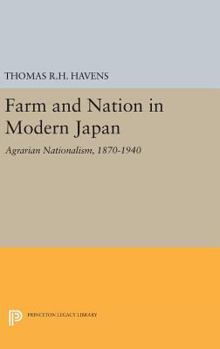Farm and Nation in Modern Japan: Agrarian Nationalism, 1870-1940
Select Format
Select Condition 
Book Overview
A study of agrarian thought in prewar Japan, this bonk concentrates on the developing fissure between official and rural conceptions of nationalism in the late nineteenth and early twentieth centuries. Professor Havens analyzes the response of Japanese farmers and their spokesmen to the pursuit of modernization during the Meiji and Taishō periods.
Through a critical examination of writings and speeches of major farm ideologues, including Gondō Seikyō, Tachibana Kōzaburō, and Katō Kanji, the author examines the ways in which agrarianist theories shaped modern Japanese nationalism and the extent to which rural ideologies triggered political violence in the turbulent 1930s. He then focuses on the romantic rural communalism of the 1920s and 1930s as an example of antigovernment nationalism designed to rescue the Japanese people at large from bureaucracy, capitalism, and urbanization. Based on extensive research in modern Japanese ideological, political, and economic materials, the study offers new insight into the early twentieth century revolution in nationality sentiments and provides fresh grounds for doubting the state's monopoly on public loyalties during the years immediately preceding Pearl Harbor. Originally published in 1974. The Princeton Legacy Library uses the latest print-on-demand technology to again make available previously out-of-print books from the distinguished backlist of Princeton University Press. These editions preserve the original texts of these important books while presenting them in durable paperback and hardcover editions. The goal of the Princeton Legacy Library is to vastly increase access to the rich scholarly heritage found in the thousands of books published by Princeton University Press since its founding in 1905.Format:Hardcover
Language:English
ISBN:0691645396
ISBN13:9780691645391
Release Date:April 2016
Publisher:Princeton University Press
Length:372 Pages
Weight:1.53 lbs.
Dimensions:0.9" x 6.1" x 9.2"
Related Subjects
History Political Science Politics & Social Sciences Social Science Social SciencesCustomer Reviews
0 rating





